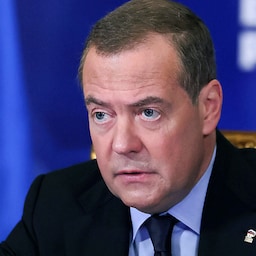The spectre of Trump
Donald Trump's talks with Vladimir Putin have made Ukraine and the rest of Europe look old. Important allies feel ignored, while the Kremlin rejoices. The "end of Europe" is already being proclaimed in Moscow.
The talks between the US President and the Kremlin leader have apparently caught Europe's leaders off guard - and the thought of being ignored is raising eyebrows. A frequent point of criticism is that Trump and his defense minister decided on behalf of Ukraine without consultation which parts of the country the war-torn state would now have to give up.
At the NATO summit in Brussels on Thursday, Pentagon chief Pete Hegseth, who has no political experience whatsoever, was unable to explain what Putin and Moscow would have to put on the table in return for peace, even when asked repeatedly. Hegseth argued that Putin would respond to "strength".
The devaluation of Europe
The new politician was unable to answer to what extent preferential treatment for Moscow exudes precisely this strength. Hegseth merely explained that "realities" should not be confused with "concessions". In just a few sentences, he managed to reduce Europe's importance on its own continent to a homeopathic role.
EU High Representative for Foreign Affairs Kaja Kallas emphasized that it was not a good tactic to give up positions before negotiations to end the war of aggression against Ukraine had even begun. An "appeasement" policy would not work. "A dirty deal" will not stop the killing. Security expert Carlo Masala saw this as an "apocalyptic scenario" that would present Europe with a fait accompli.
Ukraine would not accept any bilateral agreement on its fate that was reached between the USA and Russia without its involvement, Ukrainian President Volodymyr Zelenskyi also told the press in Kiev. Europe should be at the negotiating table when it comes to ending the war. He found Trump's prioritized treatment of Putin "unpleasant".
Moscow believes Europe's time is up
The Kremlin, on the other hand, sees itself heading for glorious times. After all, Trump has put a fifth of Ukraine's territory up for debate. Ukraine's role as an extra in the negotiations over its own state border is well received in Moscow. "In one way or another, Ukraine will of course take part in the negotiations," Kremlin spokesman Dmitry Peskov said on Russian state television on Thursday.
Triangular talks with the USA without direct contact with Ukraine are currently conceivable. However, he could not refrain from taking a swipe at the rest of Europe: Trump and Putin had not spoken about the European Union's involvement in these negotiations.
Europe's time is over!

Dmitri Medwedew
Bild: APA/AP
The deputy head of the Russian Security Council, former President Dmitry Medvedev, went one step further. He sees the phone call as proof of Europe's weakness on the international stage.
"This shows its true role in the world. Europe's time is over." He sees the agreement to start negotiations as a sign of Russia's invincibility. The talks between Putin and Trump show that Western hopes of defeating Russia can never be achieved. "It is impossible to bring us to our knees. And the sooner our opponents realize that, the better."
Trump also seems to like "strength". As a reward, he wants to expand the group of leading Western economic nations (G7) to include Russia again. In doing so, he displays a remarkable naivety: "I think Putin wants peace. I think he would tell me if he didn't want it," the US President said in the Oval Office on Thursday.
What happens now?
Alarm bells are ringing in Europe at the rapprochement with the Kremlin. The US government has made it clear that it wants to withdraw in terms of security policy. In future, "Uncle Sam's" focus will be on China and the Indo-Pacific. EU states such as Hungary and Slovakia already turned towards Moscow some time ago. This trend could gain further momentum under Trump.
Although European leaders are now demonstrating unity and rehearsing diplomatic resistance, there is deep uncertainty on the international stage. France's Defense Minister Sébastien Lecornu fears an identity crisis. NATO is the most important and most robust military alliance in history. However, the real question is: "Will that still be the case in ten or 15 years' time?"
This article has been automatically translated,
read the original article here.












Kommentare
Willkommen in unserer Community! Eingehende Beiträge werden geprüft und anschließend veröffentlicht. Bitte achten Sie auf Einhaltung unserer Netiquette und AGB. Für ausführliche Diskussionen steht Ihnen ebenso das krone.at-Forum zur Verfügung. Hier können Sie das Community-Team via unserer Melde- und Abhilfestelle kontaktieren.
User-Beiträge geben nicht notwendigerweise die Meinung des Betreibers/der Redaktion bzw. von Krone Multimedia (KMM) wieder. In diesem Sinne distanziert sich die Redaktion/der Betreiber von den Inhalten in diesem Diskussionsforum. KMM behält sich insbesondere vor, gegen geltendes Recht verstoßende, den guten Sitten oder der Netiquette widersprechende bzw. dem Ansehen von KMM zuwiderlaufende Beiträge zu löschen, diesbezüglichen Schadenersatz gegenüber dem betreffenden User geltend zu machen, die Nutzer-Daten zu Zwecken der Rechtsverfolgung zu verwenden und strafrechtlich relevante Beiträge zur Anzeige zu bringen (siehe auch AGB). Hier können Sie das Community-Team via unserer Melde- und Abhilfestelle kontaktieren.